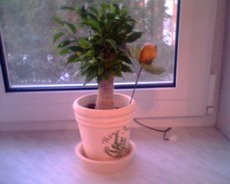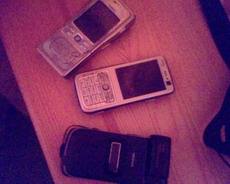Review of Nokia 8800 China Edition
The official opposition started not long ago: the end of the June last year witnessed the Finnish colossus Nokia taking out a process against two Japanese companies – Shenzhen Telsda Mobile Communication Industry Developing Co. Ltd and Xun Da Zhong Ke Electronic (Shenzhen) Co. Ltd. Nokia accused the companies of counterfeiting the old model Nokia 7260.Table of contents:
- Sales package and its peculiarities. Design
- Design
- Keypad
- Specifications
- Interface features
- Menu
- Multimedia
- Performance and computer connectivity
- Conclusion
- P.S. How to distinguish the fake from the genuine phone
By the way Nokia accused not only these companies, but also mentioned willful participants in a crime, namely two local distributors – Beijing Tongwanbao Commerce & Trade Co. Ltd An Wai Avenue No. 2 Branch and Beijing Xin Tongwanbao Commerce & Trade Co. Ltd. In the production in court the Finnish representatives demanded that companies stop producing and selling devices resembling the Nokia 7260, and also repay financial damage equal to $62,500. The trial of “prosecuting the Chinese” captured the headlines, but Nokia as well as the local media held back the information about the further events…

In a year we happened to get a phone fishily resembling another Nokia device – the flagship model of the Nokia’s 8000 series handsets – the Nokia 8800. Studying the problem, we found, that several Chinese clons of the popular Nokia phones appeared during the year, among them was even the flagship phone of the multimedia series – the N 95. The conclusion is obvious: you can prosecute the Chinese manufacturers, pull strings, but they anyway will counterfeit the phone and enter the market earlier than the original model. The Chinese recipe for success consists of two key points: modest price and recognizable design. What is hidden behind the Chinese fakes? Can they really compete with the world-known brand? Let’s try to answer these questions while checking up the Nokia 8800 China Edition.
Sales package and its peculiarities. Design
Besides the phone itself the sales package includes: a charger with Chinese ideograms, a charge cable, (the one end of it is plugged into the phone, the other – into the charger) and a battery. The cable has some peculiarities: firstly, the end for the phone is not the “round” Nokia’s one, but it is a rectangular miniUSB; secondly, the other end connecting with the charger is done in the form of common USB-jack.







Consequently, thanks to the component charger the user has 3(!) different ways of charging the battery.
- The first way is mobile. When travelling, the most convenient way to charge the battery is to use the charger only. The latter is equipped with special grooves which hold the battery. So you have to take with you in your trip only the charger and an adapter. As the manufacturer didn’t care of the potential distribution area (the device is counterfeit, its sales in Russia is banned), or they could didn’t think that the European sockets have round contacts, whereas the Chinese ones are flat and rectangular. Anyway, you can easily purchase the adapter in any radiomarket in any town.
- The second way is computer. When at home, you can charge the battery in the common way, without taking it out from the phone. Herewith, the time of charging will be the same (approx 2 hours).
- The third way is computer. Do you remember, that the charger cable is, in point of fact, a miniUSB cable? So you can wire the phone write to the worked computer or the laptop with the help of USB. But the time of charging will grow up to 3 hours.


As to the battery, it was a big disappointment to us – 650 mA/h is not enough to the convenient work even with the old models. The time of work supports my words – with the active use (about 1 hour of talks, 10 SMS, 10-20 minutes playing games) the battery becomes empty by the evening. In general, the battery is unreliable: the build quality is bad, the labels seem to be rough and ready. That’s way a user should be ready to change the battery shortly. Consequently another problem arises: where can I find the applicable battery? In fact we don’t have the service centres of the company and it hardly appears in the nearest future. Moreover, the phone has little in common with the Nokia 8800, as it is just a fake. And of course you can’t find repair parts for it, because nobody wants to sell the phone legally, which design resembles the top-brand model of the famous vendor. In fact, to sell it means to play Russian roulette with the cylinder of the gun full of the cartridges.





There is another remark concerning the service: the sample, we have checked out, could boast the chip in the middle of the low part of the glossy service of the screen after several months in use. Of course we can prescribe it to the plant defect, but it is hardly true, especially if you remember the illegal origin of the phone.

The glossy cover of the screen is made inaccurately, the left low corner juts out more than the others.
Design
The phone itself is built up carelessly: the majority of the elements joint each other with spaces, askance, the plastic is cheap and in some places it is coarse, the metal casing attracts small scratches very quickly. In general, when you cast a close look at the fake Nokia 8800, you notice it looks very low, whereas “from afar” you can hardly distinguish it from the original Nokia 8800. The slider has the same opening mechanism as the original – upward. The device is equipped with the spring assisted sliding mechanism, it works well.



Above the display locates the speaker covered with the metal insert. Its loudness lives much to be desired: in the quiet places you hear an interlocutor very good, outdoors the loudness is not enough, in the metro you can’t speak at all – you hear nothing. Beneath the display you see the sign “Nokia” opalized with all the colours of the rainbow and the support to the finger.




The upper and right edges of the Chinese phone households nothing, on the left edge you see the memory card slot (!) to the microSD cards and the 2.5mm (!) headphone jack. The majority of the low-priced (up to $100)phones feature neither memory slot, nor headphone jack. Both slots are covered with plastic plugs, that are difficult to open. Moreover, the plug to the memory slot has a low quality, as well as the slot itself. But the functionality of the handset is worth appreciating: we say it once again – the low-priced model features neither the 2.5mm headphones jack, nor the extension memory card slot. And as the phone doesn’t have the memory (there are only 600 Kb, but it is enough only for 3-4 stills), the possibility to use the memory card is almost inevitable! Since the microSD card locates not under the battery, but on the left edge of the device, the hot swap is supported by default.





The low end of the device boasts with the miniUSB slot and…a tiny (the diameter is approx one mm) hole of unclear purpose.

The back cover households the camera lens, a groove of the loud connection dynamic and a latch covering the external antenna hole. The latter can be useful, as the reception quality, unfortunately, proves to be weak. In the city reception is good, but when moving away in the country, the irritating breaks in talks appear. The same problems is when driving fast.



The large part of the back surface is protected with a metal cover of the battery. The cover is fixed with one larch only. Unfotunately, the mechanism isn’t well-thought-out: the cover is fixed loosely, and one careless motion is enough to unfasten it.



The cover hides the battery hence you can’t get it with the phone folded. To change the battery you have to open it and pick it up with a nail. Beneath the battery you find the SIM-card slot fixed with a small metal slider. But even here there are some problems. Holding mechanism of the card is so ugly, that you are unlikely to put it there right away. We should say, that after two weeks of using the phone with regular changing the SIM-card, we manage to fix it orderly in the slot only after three-four attempts.




The most peculiar feature of the Chinese phone is a label under the battery. It tells us that:
À) The handset is made of the Nokia Corporation, the model – 8800, type – RM-13 and it is even produced in the homeland of the company in Finland!

Á) the phone is certificated by the Federal Communication commingle of the USA and … Russian Department of communication!

Keypad
The keypad of the China Edition doesn’t stand out the comparable controls of the other handsets. The letters of the both alphabets are laid on correctly, though we were ready to see the contrary in the fake. The keys also boast the Chinese ideograms, though they don’t discomfort you while working with the handset. The columns of the buttons are separated with the plastic inserts reminding metal. The key control element is the five-way joystick of silver colour. It wasn’t disappointment to us: it is handy to use it both with the open and folded phone. Each move of the joystick has its dedicated application: “Up” – camera, “Down” – SMS, “ To the left” – incoming messages, “To the right” – audio player.





The keys backlight is in the vein that the modern Nokia handsets: it is blue and even. In general, we have positive impressions from the keypad.


Specifications
Whereas we don’t have the official information about the phone (unfortunately, the author of the review doesn’t master Chinese), all the specifications have to be determined by practical consideration. So, the China Edition measures 106x45x17mm in size, weight – about 120g (with the battery and memory card). The display dimension is 2in (a little more than 5sm), resolution – 176x220pixels, 65 000 colours. You can adjust 5 levels of contrast. There is 600KB built-in memory, you can expand it with the help of the microSD card. The device ships with the 1.3mpixels camera; mirror and flash are not provided. The battery capacity is 650mA/h. The phone book can have up to 300 contacts. The phone supports WAP, GPRS, there is HTML-browser. The handset lacks wireless connection modules, but the device is equipped with the 2.5-mm headset jack. The device also supports SMS, MMS and predictive input.
Interface features
You switch on the phone with the long press the reject call button, notably the “length” is about 5 – 6 seconds! After that the display shows the branded image of outstretched hands, the image for some reason is repeated twice. Turning off needs less time, but the sign – “NOKLA” that appears during the process - disheartened us. We also found shifting between the main profiles (common/vibration) non-standard to the phones of the Finnish company, it goes with the Siemens or Samsung schemes – with long pressing the pound key. But the same button is used to block the keypad as in the genuine Nokia devices: the left soft-button and then “*”
Menu
The menu is displayed in the matrix 3x4 icons and resembles the menu of the Motorola phones of the next to last generation. At least “the China Edition” has nothing in common with Nokia’s menu. So let’s have a look at each item of the menu.


Phone book
Here you can add new contact in the phone memory (300 numbers) or in the SIM-card (250 numbers), to each of the contact you may assign: name, mobile/ home/work numbers, the name of the company, e-mail, fax, note, date of birth, picture, video, sounds. Each contact from the phone book can relate to one particular group (by default there are Friends, Family, VIP, Business, other). In this item you can copy data from the SIM-card in the phone memory and vice versa, delay contacts, assign extra-numbers. In general, this item is typical to the majority of cellular phones. But it worth mentioning, that there are lots of settings.




Messages
This item of the menu gives access to the SMS/MMS settings and their editing, to the chat and voice messages. Everything is common.

Call history
Here the phone collects information not only about outgoing/missed/received calls, but also about talk duration, the number of received/sent SMS-messages. There is also a counter of GPRS data.

Settings
This menu item includes settings of the phone, network, calls, security. You can also restore factory settings…and make use of the equalizer. For the first time we meet in the phone an option to utilize the equalizer to the external speaker. Of course, taking the weakness of the latter into consideration, the equalizer seems to be useless. But the option itself is very interesting. Something similar (called 3D Tones) appears now in the new original Finnish smartphones.
Among the settings of the device I’d like to point out date and time autorenewal, “Flight Mode” support, shutdown and switch on of the phone according to schedule (!).














Then follows “Multimedia”, but I’d like to comment it hereafter.
File-manager
There is nothing interesting about this item. It has much to improve in order to have the same functionality as other phones.


Entertainment and games
“Entertainment and games” may be the most favorite item of the menu in “the China Edition” and there are several grounds to it: firstly, the phone ships with 4 preinstalled games – Copter, Puzzle, Panda and UFO ( some of them are unlikely to be original or picturesque, but at least they make you forget about a couple of working hours); secondly, you can utilize the shell program ( applying of the themes) only from here; thirdly, here also locate “stopwatch” and graphic editor. All preinstalled themes are plain as day: only the background is changing, it can be light-blue, grey or green.








Profiles
By default there are 5 profiles are available: General, Meeting, Outdoor, Indoor, Headset. To each of them you can assign keypad tones, ringing volume, signal type (vibration only; vibration and ring tone; vibration and then ring tone), replay mode.

Organizer
The organizer comprises Calendar, Notes, Alarm clock and World time. There are three alarm clocks, each of them works independently. The “World time” is common, charmless and non-functional.



Icons
This item resembles the shortcut menu. Here you can add references to the often used applications.

Extra
The developers equipped this item with Calculator, Currency converter, Size converter (only weight and length converters are available) and Health. The latter option includes two programs: the first program calculates metabolic index according the date of birth, the second one is dedicated to women, it is a calendar of the menstrual cycle.





Services
Here you find everything concerning the Internet. Unfortunately, we failed to connect to the Internet with the help of the tested phone, although all the settings were entered correctly.

Multimedia
The multimedia capabilities include camera, mediaplayer playing image, video and audio files and voice recorder. The selection is small, there is no even radio set. It is vexing, because the potential doesn’t seem to be bad, but it is realized very poorly.
The lots of camera settings (exposure correction(-4/+4), autorelease, white balance (auto, daylight, tungsten, daylight lamp, cloudy, incandescent electric lamp), degree of compression, size (160x120, 176x220, 320x240, 640x480, 1280x1024 picsels), banding (50/60 Hz) and quality (low, middle, high) have no affect on the picture quality. Apart from the aforementioned settings the user can adjust release shutter sound, zooming sound, one among the dozens of effects, plaice to save the still and apply one of the10 frames to the image.
When shooting video, you can utilize white balance, exposure, and also fix the video quality, limit to time/size of the file, compression format (H.263/MPEG4). Here you are also able to switch on/turn out sound recording, apply all affects used in the photograph.




However, plethora of the settings has no effect on the photo/video quality. To make sure in my words you can look at the shoots and video clips below, that was made with the tested phone.







Video sample 1, 3gp, 189 KB >>>
Video sample 2, 3gp, 566 KB >>>
What concerns the voice recorder, it has unlimited record time. But the quality of records leaves much room to be desired.
Performance and computer connectivity
Actually, we couldn’t test it, as the phone didn’t download JAVA-files. That is way emerges another question concerning the functionality of the device. How can we download new games and applications, if it doesn’t read any JAVA-application? The problem is not in the firmware: the “all-purpose” software is likely to be installed in all Chinese counterfeit cellular phones.
As to me, I can define the speed of the Nokia 8800 China Edition interface work as the medium. During the work with the handset I didn’t notice the glaring hangs up, but the device still lacks some extra milliseconds of the interface speed.
You notice one of the most interesting peculiarities of the phone software, when you connect it with the PC. When device is connected with the USB-port of the PC the display shows the peculiar menu. The latter allows bring the handset into the following regimes:
a)Mass Storage (it is similar to the common USB-flash memory card)
b)COM-port emulation
c) Web-camera (!)
The first two interfaces are of no interest, but the last is unique and…useless. Without program software (as far as you remember, there is no any software in the package) we can’t see the picture from the built-in camera on the display of our PC. But we’d like it! Anyway we have to mark this capability of the phone.

Conclusion
The first conclusion I came to after a month of work with the device is that the phone is unusual. The manufacturer, in fact, was able to put the nice sweet with sour taste in the bright box.
Some capabilities of the phone impressed us very much: foremost, it is the memory card slot, the 2.5-mm headset jack, numerous ways to charge the battery, lots of settings and even the work as the web-camera, when connected with the PC. And all these things cost you only $95!
On the other hand we have shocking Russification, fragile display, carelessly made casing components, poor camera, small built-in memory, weak and alleged battery and so on and so forth.
Unfortunately, the cons tip the pros, even if you have in mind its small price.
The overall conclusion is the following: Chinese under-the-counter manufacturers don’t get accustomed to sit idle. They know what, how and when they should do in order to get profit. And they also make aware of the price policy and the state-of-the-art industrial technologies, that as a result turn into the monsters like the Nokia 8800 China Edition. This phone, in fact, can be the prototype of the future budget handsets. Already now you can purchase a device priced at $100-130 with a memory card, 1.3-mpixels camera and etc. But though this tendency only now gathers pace, China has long ago been ready to produce the projects like these. All in all, we have much to think over.
P.S. How to distinguish the fake from the genuine phone
This table is for those who are going to purchase the Nokia 8800, but don’t want to be hooked with the Chinese fake. Below we cite some characteristic features of the genuine Nokia 8800 and the prototype made beyond the Chinese Wall.
The differences between original and the Nokia 8800 China Edition
| Characteristic | Original | Fake |
| Power button | On the upper edge | On the keypad |
| Joystick | No. It is replaced with the five-way D-Pad. | Yes. You can use it even with the closed phone |
| Battery cover | The sign – only “Nokia”, catch lock is below | The sign – “Nokia” and “MPEG 4”, catch lock is on the side |
| Charger slot | Round, branded | Rectangular, miniUSB |
| Battery | Nokia BL-5X (600 ìÀ/h), with hologram | With Chinese signs, 650 ìÀ/h |
| Additional speaker | NO | Yes, on the back cover |
| Location of the camera | Sliding | Built-in in the back cover |
| Headset jack | With the additional contacts | Common 2.5-jack |
| Wireless interfaces | Yes, Bluetooth | No |
| Memory | 64 ÌB, No expansion memory slot | 600KB built-in memory + microSD expansion slot |
| The sign of the display when turning off | «NOKIA» | «NOKLA» |
| Menu | Original Nokia menu | Resembles Motorola menu |
Of course the aforementioned key parameters are not the only. In spite of the similar design (though it seems alike only from afar), the phones differ, for example, like Finnish and Chinese languages.
© Written by Pavel Moskvin, Mobiset.ru
Translated by Arina Urban.
Published — 26 October 2007